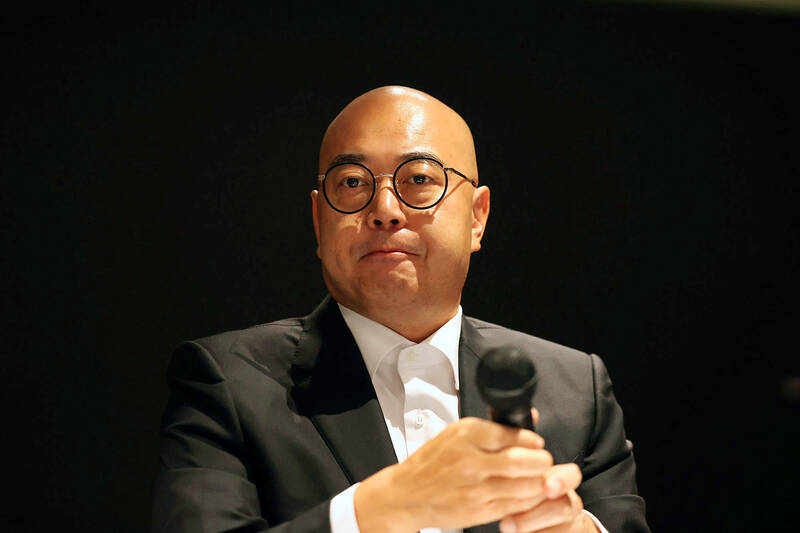A top executive of South Korea’s largest mobile chat app operator, Kakao Corp, yesterday stepped down over a widespread service outage that triggered an outpouring of complaints.
Whon Namkoong, who in March became Kakao’s co-chief executive officer, said he would resign to focus on his role as the leader of the company’s emergency task force for solving the technical problems exposed by the outage, which was caused by a fire at a data center near Seoul on Saturday.
The fire initially paralyzed most of Kakao’s services, causing huge disruption in a country where millions of people rely on the apps to chat with friends, wire money and hail taxis.

Photo: Bloomberg
Critics say the severity of the outage and Kakao’s slow recovery efforts highlighted the company’s poor backup systems and its overreliance on outsourced servers.
Kakao said that most of its services were operating normally as of yesterday morning.
SK C&C Co, which hosts Kakao’s servers at its data center in Pangyo, reportedly resumed providing full levels of electricity to those servers earlier yesterday after restoring the damaged systems.
“Because of the data center fire, I feel more miserable than ever and take to heart my grave responsibility. I will step down to demonstrate Kakao’s willingness for renovation and change,” Namkoong told a news conference.
Kakao’s sole CEO is now Hong Eun-taek.
He said that the company is investing 460 billion won (US$322 million) to build in the city of Ansan its own data center, which it plans to complete within a year.
The company also plans to establish another data center in nearby Siheung by 2024.
“We have learned our lesson from the fire, and our own data centers will be built as facilities that will be safe from fires and natural disasters like earthquakes, tidal waves and typhoons,” Hong told the news conference.
Kakao’s free chat app had about 45 million active users as of April, a huge presence in a country with a population of about 51 million people, data from market analysis firm WiseApp showed.
The firm has used the popularity of the app to branch out into banking, online shopping and Uber-like taxi services in the past few years.
Its app has also been part of the country’s COVID-19 response, including reservations for vaccines and for infection tracing.
Kakao’s chat users had dropped to about 39 million during the outage over the weekend as people began using other platforms such as Facebook’s Messenger, Telegram and Naver’s Line, WiseApp said.
South Korean President Yoon Suk-yeol said that Kakao’s service outage also exposed the problems of its dominant market presence, adding that the country’s antitrust watchdog was examining competition issues.

PATENTS: MediaTek Inc said it would not comment on ongoing legal cases, but does not expect the legal action by Huawei to affect its business operations Smartphone integrated chips designer MediaTek Inc (聯發科) on Friday said that a lawsuit filed by Chinese smartphone brand Huawei Technologies Co (華為) over alleged patent infringements would have little impact on its operations. In an announcement posted on the Taiwan Stock Exchange, MediaTek said that it would not comment on an ongoing legal case. However, the company said that Huawei’s legal action would have little impact on its operations. MediaTek’s statement came after China-based PRIP Research said on Thursday that Huawei filed a lawsuit with a Chinese district court claiming that MediaTek infringed on its patents. The infringement mentioned in the lawsuit likely involved

Taipei is today suspending work, classes and its US$2.4 trillion stock market as Typhoon Gaemi approaches Taiwan with strong winds and heavy rain. The nation is not conducting securities, currency or fixed income trading, statements from its stock and currency exchanges said. Authorities had yesterday issued a warning that the storm could affect people on land and canceled some ship crossings and domestic flights. Taiwan Semiconductor Manufacturing Co (TSMC, 台積電) expects its local chipmaking fabs to maintain normal production, the company said in an e-mailed statement. The main chipmaker for Apple Inc and Nvidia Corp said it has activated routine typhoon alert

GROWTH: TSMC increased its projected revenue growth for this year to more than 25 percent, citing stronger-than-expected demand for AI devices and smartphones The Taiwan Institute of Economic Research (TIER, 台灣經濟研究院) yesterday raised its forecast for Taiwan’s GDP growth this year from 3.29 percent to 3.85 percent, as exports and private investment recovered faster than it predicted three months ago. The Taipei-based think tank also expects that Taiwan would see a 8.19 percent increase in exports this year, better than the 7.55 percent it projected in April, as US technology giants spent more money on artificial intelligence (AI) infrastructure and development. “There will be more AI servers going forward, but it remains to be seen if the momentum would extend to personal computers, smartphones and

Catastrophic computer outages caused by a software update from one company have once again exposed the dangers of global technological dependence on a handful of players, experts said on Friday. A flawed update sent out by the little-known security firm CrowdStrike Holdings Inc brought airlines, TV stations and myriad other aspects of daily life to a standstill. The outages affected companies or individuals that use CrowdStrike on the Microsoft Inc’s Windows platform. When they applied the update, the incompatible software crashed computers into a frozen state known as the “blue screen of death.” “Today CrowdStrike has become a household name, but not in